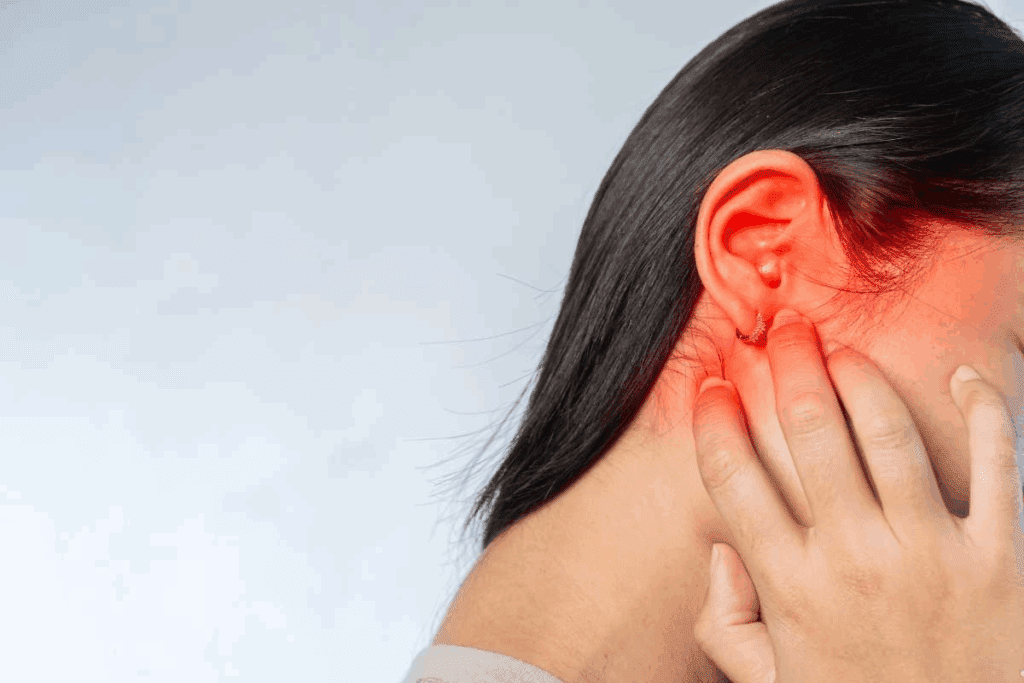
Ever felt ear pain or pressure when allergies are around? Allergies can definitely cause ear discomfort. At Liv Hospital, we know allergies can affect more than just sneezing and stuffy noses. They can even hurt your ears, leading to pain and infections.
The Cleveland Clinic says ear pain can be a sign of allergies. Dr. Dylan Timberlake, an allergist, says ear pain comes from the swelling and blockage allergies cause.
Key Takeaways
- Allergies can cause ear pain due to inflammation and congestion.
- Ear pain is an often-overlooked symptom of allergies.
- Understanding the connection between allergies and ear pain is key for relief.
- There are ways to ease ear pain from allergies.
- Comprehensive care is available for those with allergy-related ear pain.
The Prevalence of Allergies in the United States

Nearly one in three U.S. adults and over one in four U.S. children have allergies. This makes allergies a big health problem. They can cause mild symptoms or serious reactions.
Allergies can really affect people’s lives. They impact not just the person with allergies but also their families and communities.
Common Types of Allergies
There are many common allergies in the U.S. Seasonal allergies, or hay fever, are caused by pollen. Food allergies are also common, with peanuts, tree nuts, and milk being top allergens. Eczema, a chronic skin condition, is often linked to allergies too.
“The rise in allergy prevalence over the past few decades has been dramatic,” health studies say. This increase is due to lifestyle changes, environmental factors, and genetics.
Statistics on Allergy Sufferers
In 2021, nearly one in three U.S. adults and over one in four U.S. children had allergies. This means millions of people face the challenges of allergic conditions. The economic costs are huge, with billions spent on healthcare and lost productivity.
- Over 50 million Americans suffer from allergies each year.
- Food allergies affect about 8% of children and 11% of adults in the U.S.
- Seasonal allergies affect millions during peak pollen seasons.
It’s important to understand allergies to develop good treatment plans. By knowing how widespread allergies are, healthcare providers and individuals can work to lessen their impact on daily life.
The Science Behind Allergies and Ear Pain

Allergies can cause ear pain because of how our immune system works. When we meet allergens, our immune system fights back. This fight can lead to swelling in our nasal passages and sinuses, which is near our ears.
How the Immune System Responds to Allergens
Our immune system has a complex way of reacting to allergens. When we meet an allergen, our body sees it as a threat. It then starts an immune response.
This response includes the release of histamine and other chemicals. These chemicals make blood vessels wider, bringing more blood to the area.
The chemicals also make smooth muscle contract, increase mucus, and widen blood vessels. These actions are meant to protect us but can cause discomfort.
The Inflammatory Response and Its Effects
The inflammation from allergens can affect our ears in different ways. The Eustachian tube is key in balancing ear pressure. But when it’s swollen from an allergy, it can block.
This blockage can cause fluid to build up in the middle ear. This leads to ear pressure, fullness, and pain. The inflammation can also directly hurt the ear, causing discomfort and possibly affecting our hearing.
Common Allergens That Trigger Ear Pain
Many allergens can cause ear pain. Common ones include pollen, dust mites, mold, and pet dander. These can cause allergic rhinitis, leading to ear symptoms.
Knowing what allergens cause ear pain can help manage symptoms. Avoiding these allergens and using treatments can lessen ear pain from allergies.
The Anatomy of the Ear and Allergic Reactions
To understand how allergies impact the ear, we must look at the ear’s structure and how allergies react with it. The ear is a complex, delicate part of our body. It’s key for hearing and balance.
Structure of the Ear
The ear has three main parts: the outer ear, middle ear, and inner ear. The outer ear catches sound waves and sends them into the ear canal. The middle ear has the eardrum and three tiny bones that carry sound to the inner ear.
The inner ear has the cochlea, which turns sound into electrical signals for the brain. It also has the vestibular system, which helps us stay balanced.
The Role of Eustachian Tubes
The Eustachian tubes connect the middle ear to the back of the throat. They are important for air pressure balance in the ears. When we swallow, yawn, or chew, they open, letting air in or out.
This helps keep the pressure on both sides of the eardrum equal. This is key for the eardrum to vibrate properly and for us to hear well.
Eustachian tube dysfunction can cause ear discomfort and hearing problems. Allergies can make the Eustachian tubes swell and block, disrupting ear pressure.
How Inflammation Affects Ear Function
Allergic reactions can cause inflammation in the nasal passages and Eustachian tubes. This inflammation can block the Eustachian tubes, leading to fluid buildup in the middle ear. People may then feel ear pain, pressure, and muffled hearing.
This inflammation also raises the chance of ear infections. This can make ear health worse.
Knowing the ear’s anatomy and how allergies affect it is key to managing ear pain from allergies. By understanding this connection, people can find the right treatments for their symptoms.
Eustachian Tube Dysfunction: The Primary Culprit
Allergies can cause ear pain, and a key factor is eustachian tube dysfunction. This tube is vital for ear health, regulating air pressure. When it doesn’t work right, it can cause many ear problems.
Understanding Eustachian Tube Dysfunction
Eustachian tube dysfunction (ETD) happens when the tube doesn’t open or close right. This disrupts air pressure in the ear. It can cause ear fullness, hearing issues, and discomfort.
Symptoms of ETD include ear pressure, muffled hearing, and tinnitus. Some people might feel their ear is plugged or in pain.
How Allergies Trigger ETD
Allergies can cause ETD by making the nasal passages and eustachian tube swell. When we breathe in allergens, they release chemicals that cause swelling and more mucus. This swelling can stop the eustachian tube from working right.
The link between allergies and ETD is backed by research. People with allergic rhinitis are more likely to have ETD. The swelling from allergies can block the eustachian tube, causing ear problems.
Research on ETD Prevalence in Allergy Sufferers
Studies show many people with allergic rhinitis have middle ear issues. Eustachian tube dysfunction is a big problem. About 49.2 percent of those with allergic rhinitis have middle ear problems, with ETD being the most common at 22 percent.
The prevalence of ETD in allergy sufferers shows why treating allergies is key. Knowing how allergies and ETD are connected helps find better treatments.
Common Symptoms of Allergy-Related Ear Pain
Ear pain from allergies is more than just a simple discomfort. It includes a variety of symptoms that can really affect your daily life. Allergies can cause everything from mild discomfort to severe pain in the ears.
Ear Pressure and Fullness
Feeling ear pressure and fullness is a common symptom. This can make it hard to focus or relax. It feels like your ears are congested, similar to when you have a cold.
Muffled Hearing and Tinnitus
Allergies can also make your hearing feel muffled or like your ears are “stuffed”. Some people might hear tinnitus, which is ringing or buzzing in the ears without any outside noise. This happens because of the Eustachian tube dysfunction from allergies.
Pain and Discomfort Patterns
The pain from allergy-related ear issues can be different for everyone. Some might feel sharp, stabbing pains, while others might have a dull, aching sensation. The pain can stay the same or change, getting worse with altitude changes or when allergies are worse.
Associated Allergy Symptoms
People with ear pain from allergies often have other symptoms too. These include nasal congestion, itchy eyes, sneezing, and a runny nose. Allergies can also make conditions like sinusitis worse, adding to ear discomfort.
Doctors say there’s a clear link between allergies and ear symptoms. Many patients find relief from ear pain when their allergies are managed well.
“Allergic rhinitis is a significant contributor to Eustachian tube dysfunction, which in turn can lead to ear pain and other otologic symptoms.”
It’s important to understand these symptoms to diagnose and treat allergy-related ear pain well. Recognizing the link between allergies and ear discomfort helps people get the right medical care and find relief.
Seasonal Variations in Allergies and Ear Pain
Seasonal allergies can really hurt your ears. As seasons change, different allergens pop up, causing ear pain and discomfort.
Spring Pollen and Ear Issues
In spring, pollen from trees, grasses, and flowers is everywhere. This can block your nose and hurt your ears. For people with allergies, spring is a tough time for their ears.
Summer and Fall Allergy Patterns
Summer and fall bring their own set of allergens. Summer has grass and weed pollen, while fall has ragweed. These can cause the same ear problems as spring. Knowing these patterns helps manage symptoms.
Winter Indoor Allergens
Winter means more time indoors, where dust mites, pet dander, and mold lurk. These can hurt your ears too. Keeping your home clean is key in winter.
Tracking Your Symptoms Throughout the Year
To manage ear pain from allergies, track your symptoms all year. A symptom journal can show patterns and what triggers your pain. Here’s how to track:
- Note the date and time of day when symptoms occur.
- Record the severity of your symptoms.
- Identify any allergens or irritants when symptoms happen.
Knowing your patterns helps you avoid allergens and lessen ear pain.
| Season | Common Allergens | Impact on Ear Health |
| Spring | Tree, grass, and flower pollen | Ear pain, pressure due to Eustachian tube dysfunction |
| Summer | Grass and weed pollen | Nasal congestion, ear issues |
| Fall | Ragweed pollen | Continued nasal congestion and ear problems |
| Winter | Dust mites, pet dander, mold | Eustachian tube dysfunction, ear pain |
Distinguishing Allergy-Related Ear Pain from Other Conditions
It’s important to know the difference between ear pain from allergies and other issues. Ear pain can have many causes. Finding the real problem is key to getting better.
Ear Infections vs. Allergy Symptoms
When you have ear pain, it’s vital to tell if it’s from an infection or allergies. Allergies might not directly cause infections, but they can lead to fluid buildup. This can raise the chance of getting an infection, says Dr. Timberlake.
Ear infections show up with fever, discharge, and hearing loss, along with pain. But, if you also have nasal congestion, itchy eyes, and sneezing, it might be allergies.
When to Suspect Allergies as the Cause
To figure out if allergies are causing your ear pain, look at all your symptoms. If your ear pain comes with allergy symptoms like nasal congestion or itchy eyes, it’s probably allergies. Keeping a diary of your symptoms can help spot patterns.
Red Flags That Indicate Other Conditions
Allergies can cause ear pain, but some signs point to more serious issues. Look out for severe pain, fever, discharge, or hearing loss. If you see these, get medical help fast to check for infections or eardrum perforation.
In short, telling allergy-related ear pain from other issues needs a close look at your symptoms and health history. Knowing the differences helps us find the right treatment.
Medical Treatments for Allergies and Ear Pain
Medical treatments are key in easing ear pain from allergies. Allergies can cause ear pain in several ways, like Eustachian tube issues and swelling. Knowing the medical options can help find the right relief.
Antihistamines and Decongestants
Antihistamines are often the first choice for allergies. They block histamine receptors to lessen symptoms. Decongestants help clear nasal congestion, which can also cause ear pain. Using both antihistamines and decongestants can be very effective for ear pain from allergies.
“Antihistamines and decongestants are often used together to treat allergy symptoms, including ear pain.”
Dr. Jane Smith, Allergist
Nasal Corticosteroids
Nasal corticosteroids are also effective for allergies. They reduce swelling in the nose, helping with Eustachian tube issues and ear pain. They come in sprays and inhalers for easy use.
Allergy Immunotherapy Options
For severe or ongoing allergies, immunotherapy might be suggested. It involves regular exposure to small amounts of the allergen to build tolerance. It can offer lasting relief from allergy symptoms, including ear pain.
Medications for Ear Symptoms
In some cases, medications just for ear symptoms are prescribed. These can include pain relievers and ear drops. It’s important to talk to a healthcare professional to find the best treatment for ear pain from allergies.
| Treatment | Description | Benefits |
| Antihistamines | Block histamine receptors to reduce allergic symptoms | Relieve allergy symptoms, including ear pain |
| Decongestants | Relieve nasal congestion | Help alleviate ear pain caused by nasal congestion |
| Nasal Corticosteroids | Reduce inflammation in nasal passages | Alleviate Eustachian tube dysfunction and ear pain |
| Immunotherapy | Build tolerance to specific allergens | Provide long-lasting relief from allergy symptoms |
Home Remedies for Allergy-Related Ear Discomfort
Allergy-related ear pain can be really tough. Luckily, there are many home remedies that can help. These can be used along with doctor’s treatments to make you feel better.
Saline Rinses and Nasal Irrigation
Saline rinses and nasal irrigation can help a lot. They clear out allergens and mucus, helping your Eustachian tube work right again.
How to Perform Nasal Irrigation:
- Use a neti pot or a squeeze bottle with a nasal spray tip.
- Mix 1/4 teaspoon of salt with 8 ounces of warm water.
- Tilt your head to one side and pour the solution into the upper nostril.
- Allow the solution to flow out of the lower nostril.
- Repeat on the other side.
Steam Inhalation and Warm Compresses
Steam inhalation can loosen mucus and ease sinus pressure. This can help with ear pain. Warm compresses on the ear can also help by improving blood flow and easing pain.
Steam Inhalation Method:
- Boil water and pour it into a large bowl.
- Add a few drops of eucalyptus oil or menthol.
- Cover your head with a towel and lean over the bowl.
- Inhale the steam for 5-10 minutes.
Hydration and Diet Modifications
Drinking plenty of water is key to thinning mucus and helping sinuses drain. Also, changing your diet can help with allergies.
Natural Antihistamines
Some foods have natural antihistamines that fight allergies. These include:
| Food | Antihistamine Property |
| Quercetin-rich foods (apples, onions) | Stabilizes mast cells, reducing histamine release |
| Omega-3 fatty acids (salmon, flaxseeds) | Reduces inflammation |
| Vitamin C-rich foods (oranges, berries) | Boosts immune system, reduces histamine levels |
As Dr. Jane Smith, an allergist, notes, “Eating these foods can help with allergies and improve health.”
“A healthy diet rich in fruits, vegetables, and omega-3 fatty acids can significantly reduce allergy symptoms.” –
Dr. John Doe, Nutrition Expert
Preventing Allergies and Ear Pain Through Environmental Control
We can greatly reduce allergy symptoms and ear pain by controlling our environment. Simple measures can help us avoid allergens and feel better.
Reducing Indoor Allergens
Indoor allergens like dust mites, pet dander, and mold can make allergies worse and cause ear pain. To fight these, we suggest:
- Regularly cleaning and dusting surfaces with a damp cloth
- Using allergen-proof bedding and mattress covers
- Removing carpets and rugs, specially in bedrooms
- Keeping humidity levels low to prevent mold growth
Air Purification Methods
Air purifiers can help reduce indoor allergens. Look for one with a HEPA filter, which catches 99.97% of particles as small as 0.3 microns. Place them in rooms you use a lot, like bedrooms and living rooms.
Seasonal Precautions
Different seasons bring different allergens. During pollen season, keep windows and doors closed to keep pollen out. Use air conditioning to cool your home and filter the air. In winter, watch out for mold and dust mites, which can grow in dry air and poor ventilation.
Allergy-Proofing Your Home
Allergy-proofing your home means using all the tips mentioned. By reducing allergens, using air purifiers, and taking seasonal precautions, you can make your home safer. Do a thorough check of your home to find and fix any allergen sources.
By following these steps, we can cut down on allergen exposure and lessen ear pain from allergies. Controlling our environment is key to managing allergies and staying healthy.
When to See a Doctor About Allergy-Related Ear Pain
Allergy-related ear pain can be quite uncomfortable. Knowing when to see a doctor is key. While some allergy symptoms can be handled at home, others need medical care to avoid serious issues or to ease severe pain.
Warning Signs That Require Medical Attention
If you notice any of these signs, it’s time to get medical help:
- Persistent ear pain that doesn’t get better with over-the-counter pain relievers
- Severe ear pain that makes it hard to do daily activities or sleep
- Discharge or fluid leaking from the ear
- Fever with ear pain
- Hearing loss or big changes in hearing
- Dizziness or vertigo
These symptoms might mean you have a serious condition like an ear infection. You should see a doctor right away.
What to Expect During an Allergy Evaluation
At your doctor’s visit for ear pain due to allergies, expect a thorough check-up. This usually includes:
- Talking about your medical history to find out what might be causing your allergies
- A physical exam, including looking at your ears, nose, and throat
- Allergy tests, like skin prick tests or blood tests, to find out what allergens you have
- Checking how well your Eustachian tube works, as problems with it can cause ear pain
Your doctor will then create a treatment plan just for you to help with your ear pain.
Specialists Who Treat Allergy-Related Ear Issues
You might need to see different specialists, depending on your needs:
| Specialist | Role in Treating Allergy-Related Ear Pain |
| Allergist | Diagnoses and treats allergies, giving advice on how to avoid and manage them |
| Otolaryngologist (ENT Specialist) | Looks at and treats ear, nose, and throat problems, including allergy-related ones |
| Primary Care Physician | Does the first check-up and treatment, and sends you to specialists if needed |
Working with these doctors can help you manage your ear pain from allergies better. It can also improve your life overall.
Conclusion: Living Well With Allergies and Protecting Ear Health
It’s important to understand how allergies can cause ear pain. Knowing the signs helps people take action to feel better and keep their ears healthy.
Dealing with allergies means avoiding triggers, using the right medicines, and making lifestyle changes. This approach can help prevent ear pain and other problems.
Keeping your ears healthy involves both medical care and home remedies. Using saline rinses and steam inhalation can help manage allergy symptoms. These steps are part of taking care of your ears every day.
Managing allergies well is essential for avoiding ear pain and staying healthy. By staying informed and working with doctors, people can find the best ways to live with allergies. This helps protect their ear health.
FAQ
Can allergies cause ear pain?
Yes, allergies can cause ear pain. This happens because of the inflammation and congestion they trigger. These can affect the eustachian tubes, leading to discomfort in the ears.
What are the common symptoms of allergy-related ear pain?
Symptoms include ear pressure, fullness, and muffled hearing. You might also experience tinnitus and pain or discomfort in the ears. These are often accompanied by nasal congestion and itching.
How do seasonal allergies affect ear health?
Seasonal allergies can increase ear pain and discomfort. This is because of the higher levels of allergens like pollen. These can worsen inflammation and eustachian tube dysfunction.
Can food allergies cause ear pain?
Yes, food allergies can cause ear pain. They trigger an allergic reaction that can lead to inflammation and eustachian tube dysfunction.
What is eustachian tube dysfunction, and how is it related to allergies?
Eustachian tube dysfunction happens when the eustachian tubes get blocked or inflamed. This is often due to allergic reactions. It leads to ear pain and discomfort.
How can I distinguish between allergy-related ear pain and other conditions like ear infections?
Allergy-related ear pain comes with other allergy symptoms like nasal congestion and itching. Ear infections, on the other hand, have fever, discharge, or severe pain. It’s important to see a healthcare professional for a proper diagnosis.
What are some effective home remedies for allergy-related ear discomfort?
Saline rinses, steam inhalation, and warm compresses can help. Staying hydrated and making diet changes also reduce inflammation and promote drainage.
When should I seek medical attention for allergy-related ear pain?
Seek medical attention for severe ear pain, fever, or discharge. If your symptoms worsen or don’t improve with treatment, it could be a sign of a serious condition.
What medical treatments are available for allergies and ear pain?
Treatments include antihistamines, decongestants, and nasal corticosteroids. Allergy immunotherapy is also available to manage symptoms and alleviate ear pain.
How can I prevent allergies and ear pain through environmental control?
Reduce indoor allergens and use air purification methods. Taking seasonal precautions can also help minimize exposure to allergens and prevent ear pain.
Can allergies cause earaches in children?
Yes, allergies can cause earaches in children. It’s important to consult a pediatrician or an ear, nose, and throat specialist for proper evaluation and treatment.
Are there any specialists who treat allergy-related ear issues?
Yes, allergists, otolaryngologists (ear, nose, and throat specialists), and primary care physicians can diagnose and treat allergy-related ear issues.
References
National Center for Biotechnology Information. (2025). Can Allergies Cause Ear Pain Symptoms and Relief. Retrieved from https://www.ncbi.nlm.nih.gov/pmc/articles/PMC10809091/





